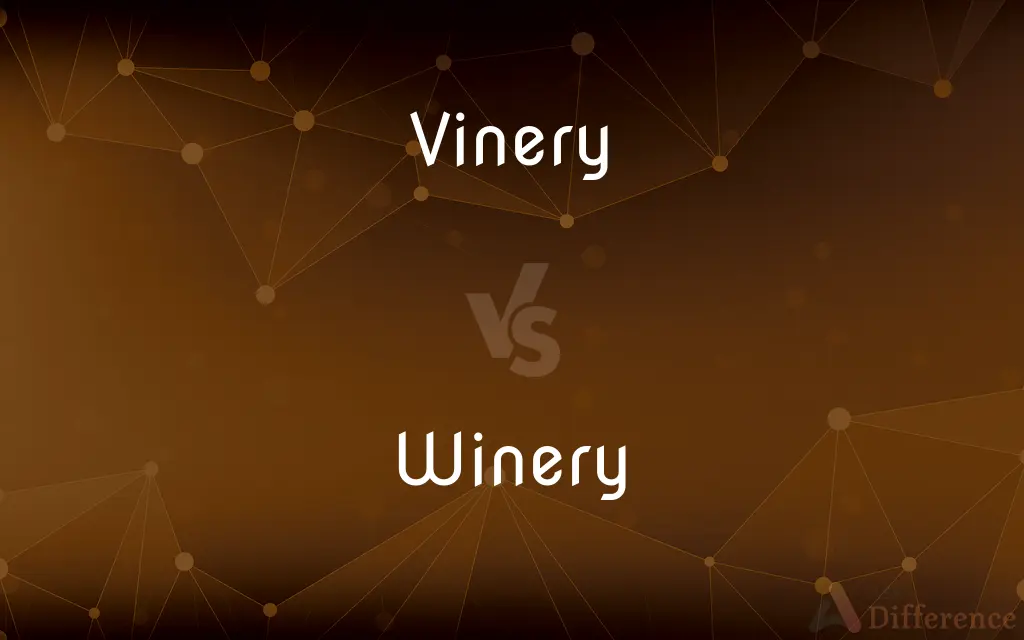Vinery vs. Winery — What's the Difference?
Edited by Tayyaba Rehman — By Fiza Rafique — Updated on April 1, 2024
A vinery is a greenhouse for growing grapes, focusing on cultivation in controlled environments, while a winery is a facility where grapes are processed into wine, emphasizing fermentation and bottling processes.

Difference Between Vinery and Winery
Table of Contents
ADVERTISEMENT
Key Differences
A vinery, also known as a grapehouse, is dedicated to the cultivation of grapevines under controlled conditions, such as temperature and humidity, to optimize grape growth. This environment is especially beneficial in regions with climates not naturally suited for grape cultivation. In contrast, a winery is a production facility where harvested grapes are crushed, fermented, aged, and finally bottled to produce wine. It's the next step in the journey of grape from vine to wine bottle.
Vineries are architectural structures that can range from simple greenhouses to elaborate glass buildings, designed to create an ideal microclimate for grape vines. These structures can include advanced irrigation, ventilation, and temperature control systems. Wineries, on the other hand, are equipped with fermentation tanks, barrels for aging, and bottling lines. The design and equipment of a winery are focused on the technical and chemical processes of winemaking.
The purpose of a vinery is primarily agricultural, aiming to produce high-quality grapes by providing an optimal growing environment. This focus on grape cultivation makes vineries crucial in regions where outdoor grape growing is challenged by weather conditions. Conversely, the purpose of a winery is to transform these grapes into wine, involving processes such as fermentation, clarification, aging, and bottling, which require a different set of expertise and equipment.
While vineries and wineries can be part of the same operation, especially in estate wineries where the process from grape cultivation to winemaking is integrated, they serve distinct roles in the production of wine. Vineries are concerned with the early stage of grape cultivation, whereas wineries are involved in the latter stages of processing, aging, and packaging the wine.
The choice between visiting a vinery or a winery depends on one's interest in the wine production process. A visit to a vinery offers insight into the cultivation and care of grapevines, while a winery provides a closer look at the art and science of winemaking, from fermentation to the final product ready for consumption.
ADVERTISEMENT
Comparison Chart
Primary Focus
Cultivation of grapevines.
Processing grapes into wine.
Structure
Greenhouse or glasshouse for growing grapes.
Facility equipped with fermentation tanks, barrels, and bottling lines.
Purpose
To provide an optimal growing environment for grapes.
To ferment, age, and bottle wine.
Role in Wine Production
Concerned with the agricultural aspects of grape growing.
Focused on the technical and chemical processes of winemaking.
Ideal For
Regions with climates not naturally suited for grape growing.
Regions with suitable grape production looking to produce wine.
Compare with Definitions
Vinery
Architectural structure for grape growth.
The estate's vinery is a stunning glass structure designed for optimal sunlight.
Winery
Equipped for fermentation and bottling.
The modern winery has state-of-the-art bottling equipment for efficiency.
Vinery
Used in regions with challenging climates.
In colder climates, a vinery is essential for producing quality grapes.
Winery
Focuses on the art and science of winemaking.
The winery's master vintner combines traditional and modern techniques.
Vinery
Focuses on controlled environment cultivation.
The advanced vinery utilizes hydroponics for year-round grape production.
Winery
A facility where wine is made.
The winery offers tours of its fermentation tanks and aging barrels.
Vinery
A greenhouse for growing grapes.
The vinery houses several varieties of grapes for experimental cultivation.
Winery
Processes grapes into wine.
After harvest, the grapes are transported to the winery for crushing and fermentation.
Vinery
Agricultural aspect of winemaking.
The vinery's role is crucial in the early stages of the estate's winemaking process.
Winery
Offers insights into wine production.
Visitors to the winery can taste wines at different stages of aging.
Vinery
A farm of grapevines where wine grapes are produced
Winery
A winery is a building or property that produces wine, or a business involved in the production of wine, such as a wine company. Some wine companies own many wineries.
Vinery
A greenhouse, especially for growing grapevines.
Winery
An establishment at which wine is made.
Vinery
A vineyard.
Winery
A place where wine is made, or a company that makes wine.
Vinery
A vineyard.
Winery
A place where grapes are converted into wine.
Vinery
(obsolete) A structure, usually enclosed with glass, for rearing and protecting vines; a grapery.
Winery
Distillery where wine is made
Vinery
A vineyard.
Vinery
A structure, usually inclosed with glass, for rearing and protecting vines; a grapery.
Common Curiosities
What is a vinery?
A vinery is a greenhouse or structure designed for the cultivation and growth of grapevines under controlled conditions.
How do vineries and wineries differ in purpose?
Vineries focus on growing grapes in optimal conditions, while wineries are dedicated to the production of wine from those grapes.
What is a winery?
A winery is a facility where grapes are processed into wine, involving steps like fermentation, aging, and bottling.
How do vineries control the grape growing environment?
Vineries control temperature, humidity, and light, often employing advanced systems for irrigation and ventilation.
What makes a vinery different from a traditional vineyard?
A vinery is a controlled environment for grape growth, typically a greenhouse, whereas a vineyard is an outdoor area where grapevines are planted.
Is visiting a winery educational?
Yes, visiting a winery can provide valuable insights into the winemaking process, from grape processing to tasting the finished product.
What equipment is commonly found in a winery?
Common equipment in a winery includes fermentation tanks, oak barrels for aging, and bottling lines.
Can a winery have its own vinery?
Yes, some estate wineries have their own vineries to closely control the quality and supply of grapes for winemaking.
Why are vineries important in wine production?
Vineries are important for producing high-quality grapes, especially in regions where the natural climate is not conducive to grape growing.
What are the benefits of a winery owning a vinery?
Owning a vinery allows a winery to ensure a consistent and high-quality grape supply, directly influencing the quality of the wine produced.
What factors influence the design of a winery?
The design of a winery is influenced by functional requirements for winemaking processes, as well as aesthetic considerations for visitor experiences.
What processes take place in a winery?
Processes in a winery include crushing grapes, fermenting the juice, aging the wine, and bottling the final product.
What role does a vinery play in winemaking?
A vinery plays a crucial role in the early stage of winemaking, focusing on the cultivation and health of grapevines.
Can the public visit vineries and wineries?
While wineries commonly offer tours and tastings, public access to vineries may be more limited and focused on educational purposes.
How do climate conditions affect the operation of a vinery?
Vineries mitigate adverse climate conditions by providing a controlled environment for grape growth, making year-round production possible.
Share Your Discovery

Previous Comparison
Beautician vs. Cosmetologist
Next Comparison
Ecosystem vs. BiodiversityAuthor Spotlight
Written by
Fiza RafiqueFiza Rafique is a skilled content writer at AskDifference.com, where she meticulously refines and enhances written pieces. Drawing from her vast editorial expertise, Fiza ensures clarity, accuracy, and precision in every article. Passionate about language, she continually seeks to elevate the quality of content for readers worldwide.
Edited by
Tayyaba RehmanTayyaba Rehman is a distinguished writer, currently serving as a primary contributor to askdifference.com. As a researcher in semantics and etymology, Tayyaba's passion for the complexity of languages and their distinctions has found a perfect home on the platform. Tayyaba delves into the intricacies of language, distinguishing between commonly confused words and phrases, thereby providing clarity for readers worldwide.
















































